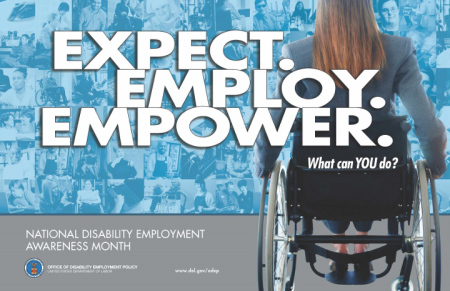Difficulties of Disability Disclosure
August 19, 2015

|
My wheelchair likes to make a grand entrance when I go into a room. It's there, it's large, and it's up to me to show that I'm in charge. Having a visible mobility aid means that when I go to a job interview, I simply can't avoid indirect disclosure about being disabled. My body takes care of disclosing for me, loud and clear.
However, disability is nuanced far beyond what meets the eye, whether it is a visible or non-visible disability. This can make navigating the disclosure of disability a complex or perhaps even intimidating process for both employees and employers. The key is to strike a balance. For employees, this means determining what, if anything, is necessary to share, and what can and should remain private. For employers, this means inquiring as to how an employee needs to be accommodated without requesting to know personal details that are irrelevant to the job.
The problem is that lines on either side are sometimes hazy and easily crossed. I learned this the hard way when I first began searching for jobs after graduating college. I applied for a teaching assistant position at a school for students with disabilities, thinking my personal experience with my disability would ultimately be a positive contribution to the classroom. Unfortunately, when I shared this in answer to one of the first questions asked during my preliminary phone interview, the conversation immediately went south. In this case, my conscious choice to disclose that I have a disability completely backfired, leading the employer to make assumptions that my disability would negatively impact my ability to be an effective teaching assistant - without even taking time to discuss my qualifications for the position.
I often think that when interviewing for the teaching assistantship, I didn't have to disclose my disability in the first place. I choose to look back on that experience as a lesson I'll always carry with me. Now, I make every effort to ensure that my qualifications speak louder than any preconceived notions. That is difficult, however, as my resumé lends itself to giving quite a few hints that I have a disability, since the vast majority of my work is centered on disability.
I'm lucky to find myself at a point in my career where not only am I not afraid to disclose my disability, but also I find it to be a personal selling point. For far too many people, though, this feeling of being comfortable discussing aspects of their disability in the workplace is nonexistent. For many, the mere thought of disclosure frequently brings about fear and raises uncertainties. Will an employer still hire someone if the job candidate is blind and requests screen-reading software to complete work? What if an employee tells a colleague about having a non-visible disability, such as ADHD or bipolar disorder? Will the employer find out and fire the employee? How about if someone uses a wheelchair and requests that hand rails be installed in the company restroom?
Not hiring or firing an employee for any of these types of reasons is illegal for entities covered by the Americans with Disabilities Act and the Rehabilitation Act, and yet, the sad reality of the workforce is that discrimination like this continues to happen every day. The provision of reasonable accommodations to ensure employees with disabilities can do their jobs isn't just the right thing to do; it's legally required. Justice and equal treatment in the workplace is a right for every person with a disability. And beyond the law, including people with disabilities in the workforce adds depth, richness, and new ideas stemming from the life experiences we bring.
Of course, in bringing disability experience to the table, there's a good chance some disclosure might happen, either during interviews or throughout the course of a job. Questions might come about from employers or other colleagues as work relationships and friendships develop. Because of this, it's technically accurate for me to say I've had employers breach disclosure boundaries, but I know it was with no negative intent and I certainly wouldn't call it an act of discrimination.
Usually, situations like these come from a place of genuine curiosity, concern, or the desire to help. As such, my general rule is to keep things fluid and open when it comes to disclosure. Share if you're comfortable, but know that you're never under any obligation to talk about aspects of your disability other than what relates specifically to reasonable accommodation needs. The most important thing to remember is that your disability cannot and should not ever be held against you in a place of work, and if it is, the law is on your side.
True progress, though, is found not in abiding by the law for the law's sake, but in actual acceptance of disability. Disclosure should not be a reason to worry about one's livelihood, but rather something that makes no difference to how an employer perceives an employee. Everyone brings a unique identity with them to work, and for people who are disabled, our disabilities are just one facet of who we are - at once a potential asset to the workplace and a trait that should never overshadow the value of the skills and experiences we have worked so hard to achieve.
Emily Ladau is a writer and disability rights activist whose passion is to harness the powers of language and social media as tools for people to become informed and engaged social justice advocates. She is the owner of Social Justice Media Services, which provides communications, outreach, and social media management services for disability-related organizations. Emily also maintains a blog, Words I Wheel By, as a platform to address discrimination and to encourage people to understand the experience of having a disability in more positive, accepting, and supportive ways. You're welcome to connect with her on Facebook and Twitter.







